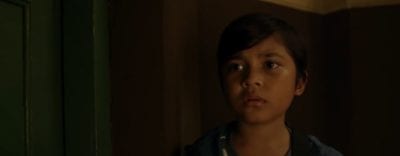There’s always more horror to be found at the orphanage. Two titans of Indonesian cinema in Kimo Stamboel (Macabre, Headshot, Dreadout) and Joko Anwar (Satan’s Slaves, Impetigore) have united to create Ratu Ilmu Hitam—released in English as The Queen of Black Magic—a loose remake of the original 1980 film and the latest in a series of ghostly tales from a region that is creating a strong foothold in the world of horror cinema.
A family takes a trip to the remote orphanage where the father (Ario Bayu) was raised in order to pay respects to its dying caretaker, Yaya Unru (Pak Bandi). Old relationships are rekindled and care is given to the old man on his deathbed, then as the day turns into night, it gradually becomes clear that dark magic has taken hold of the orphanage, and it’s eager to reunite with its children.
Director Kimo Stamboel is best known for his collaborations with Timo Tjahjanto. Together they make up the filmmaking duo The Mo Brothers—creators of 2009’s Rumah Dara (aka Macabre) and 2014’s Kirazu (aka Killers)—though recently the two have found success on their own, which can only be a good thing for Indonesian film as a whole.
Joko Anwar, the writer for The Queen of Black Magic, started out as a journalist and film critic but has become one of Indonesia’s most prolific filmmakers. He directed Satan’s Slaves in 2017 (a loose remake-prequel of the 1980 film of the same name) and Impetigore in 2019; both are intense horror films that helped solidify both Joko Anwar and Indonesian cinema on the global stage, and both are must-watches for horror obsessives!

Like so many great horror films before it, The Queen of Black Magic utilizes the genre’s familiar tropes without dulling their sharp precision. And the strength of the film lies in its ability to keep the viewer guessing. Take for example the opening scene: after an all-too-familiar tracking shot of a car driving through ominous woods, Hanif and his family hit a deer.
After the initial shock of the crash wears off, the family continues on their trip to the orphanage, but before we jump to the opening title the camera sinks down to reveal a gravely wounded, young girl. This early, shocking twist sets the tone for the rest of the story, which consistently lures its audience into a sense of familiarity only to pull the rug from underneath it moments later.
The terrifying tale of Ms. Mirah—a woman who was murdered after being accused of sacrificing orphans to the devil—is chillingly told to us by a young girl named Rani (Shenina Cinnamon) and masterfully directed in a fashion that puts us on the same level as the terrified yet intrigued child she’s telling it to.

That child is Haqi, skillfully played by Muzakki Ramdhan who also worked with Joko Anwar on his superhero film Gundala and in the first episode of HBO’s Folklore, entitled “A Mother’s Love.” Muzakki Ramdhan is the kind of child actor that you wish could stay young forever, eternally playing the terrified kid with the acting prowess of a seasoned stage actor. And he is but one of the talented actors that round out this large cast.
The family of five that we are introduced to in the beginning receives the most screen time, and most of the family does a remarkable job earning the sympathies of the viewer. Hannah Al Rashid (Gundala, Dreadout, The Night Comes for Us) plays a mother named Nadya that convincingly portrays the frantic energy of a person protecting their family. Adhisty Zara plays Dina, the teenage daughter who quickly becomes enamored with a young man from the orphanage, with a playful sincerity that elevates what could have been a boring trope in the hands of a lesser film.
Other characters are mostly whittled down to a few unsavory quirks: Lina (Salvita Decorte) is obsessed with her appearance. Eva (Imelda Therinne) would rather be anywhere else than paying respects at a dirty, decrepit orphanage. And their spouses—played by Tanta Ginting and Miller Khan, respectively—are unaware of the pain that is about to unfold on their loved ones.
While sudden, brutal kills can be the highlight of a horror film, skilled directors know when to dispose of their protagonists and when to leave them begging for death. Perhaps the most impressive thing about Kimo Stamboel’s film, and Joko Anwar’s script, is the empathy that is given to each character.
The dread is built at such a gradual pace that one starts to believe that our most beloved characters will be spared, that the film doesn’t have the heart to punish these wholesome folk. But worry not, gore-hounds, you’ll get your fix.
And if that isn’t enough to get you to rent this one, let me just say five words: a bus full of dead orphans.

For a film that often shows masterful restraint, one CGI death in particular kind of bugged this reviewer in a way that deflated the tension. And the final act of the film is so wonderfully chaotic that I wish they wouldn’t have walked-back some of its severity. However, the film survives these mistakes and is a welcome addition to both Shudder and Indonesian cinema.
Instead of a boring rating scale, I use a simpler system. Dead (don’t watch, as it adds nothing of substance to the genre) or Alive (add this film to your ever-growing list of scary movies to watch). And I am pleased to say that The Queen of Black Magic is most certainly alive and well.
Other Must-Watch Indonesian Films
Impetigore (2019)—Joko Anwar’s tale of a village cursed into infertility is one of the best ghost stories in ages and is also available on Shudder.
Satan’s Slaves (2017)—The death of a mother throws a family down a spiral of horror. Helped Anwar make a name for himself in horror and established his relationship with Shudder. If you haven’t yet seen it, throw this one on the top of your list.
Folklore (2018)—Is a fantastic series on HBO Asia in which each episode represents the folklore of a specific Asian territory and is directed by a different up-and-coming director from the region. And good news! Season 2 has just been announced!
Macabre (2009)—An Indonesian classic from The Mo Brothers. It’s fun. It’s gory. It’s a masterpiece.
Update: This article originally stated that Kimo Stambeol and not Joko Anwar directed Gundala.



Thanks for pointing that out, Elok! Updated the change.
Enjoyed the review. But It was Joko Anwar who directed Gundala, not Kimo.